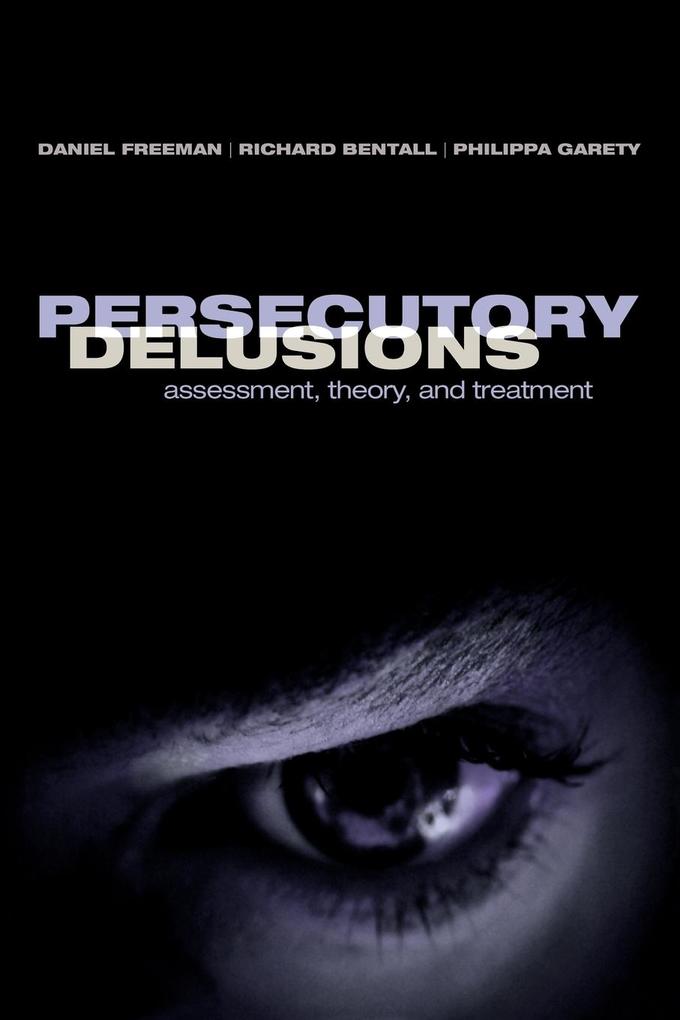Bücher versandkostenfrei*100 Tage RückgaberechtAbholung in der Wunschfiliale
10% Rabatt10 auf Toniebox 1, Figuren & Zubehör mit dem Gutscheincode: TONIE10
Jetzt einlösen
mehr erfahren
Zustellung: Di, 23.09. - Fr, 26.09.
Versand in 5 Tagen
VersandkostenfreiBestellen & in Filiale abholen:
Persecutory delusions, the unfounded beliefs that others intend harm to the individual, are a major psychiatric problem. They are a common feature of severe mental illnesses such as schizophrenia, delusional disorder and bipolar disorder, often lead to admission to psychiatric hospital, and are a cause of considerable distress to patients and carers. However, increasingly it is recognised that persecutory delusions reflect the severe end of a spectrum of paranoia, which also encompasses beliefs and worries about threats from others that are common in the general population. In the last ten years an increasing number of researchers and clinicians have focussed on explaining paranoid experience in both clinical and non-clinical populations, with fascinating results. This recent research is presented for the first time as a book.
In this landmark publication, the three major authorities in the field bring together the current knowledge about the assessment, understanding, and treatment of persecutory delusions. Leading experts in cognitive psychology, neuropsychology, psychiatry, social psychiatry, neuroimaging, and neuroscience explain their perspectives on paranoia. Pharmacological, cognitive, and family interventions are comprehensively reviewed, and personal accounts of paranoia are included.
In this landmark publication, the three major authorities in the field bring together the current knowledge about the assessment, understanding, and treatment of persecutory delusions. Leading experts in cognitive psychology, neuropsychology, psychiatry, social psychiatry, neuroimaging, and neuroscience explain their perspectives on paranoia. Pharmacological, cognitive, and family interventions are comprehensively reviewed, and personal accounts of paranoia are included.
Inhaltsverzeichnis
- 1: Peter Chadwick: A personal account
- Assessment, Epidemiology and Prognosis
- 2: Daniel Freeman: The assessment of persecutory ideation
- 3: Bart Rutten, Jim van Os, Mari Dominguez and Lydia Krabbendam: Epidemiology and social factors: findings from the Netherlands Mental Health Survey and Incidence Study (NEMESIS)
- 4: Martin Harrow, Thomas Jobe and Ellen Astrachan-Fletcher: Prognosis of persecutory delusions in schizophrenia: a 20-year longitudinal study
- 5: Jayne Taylor: Violence and persecutory delusions
- 6: Alistair Munro: Persecutory delusions in the setting of delusional disorder
- Theory - Psychological Processes
- 7: Daniel Freeman, Philippa Garety and David Fowler: The puzzle of paranoia
- 8: Richard Bentall, Peter Kinderman and Michael Moutoussis: The role of self-esteem in paranoid delusions: The psychology, neurophysiology and development of persecutory beliefs
- 9: Dennis Combs and David Penn: Social cognition in paranoia
- 10: Rhiannon Corcoran and Suzanne Kaiser: Persecutory delusions and theory of mind: long-standing debates and emerging issues
- 11: Robyn Langdon, Ryan McKay and Max Coltheart: The cognitive neuropsychological understanding of persecutory delusions
- Theory - Biological Processes
- 12: Marc Laruelle: Dopamine and persecutory delusions
- 13: CÃ(c)cile Henquet, Marta Di Forti, Robin Murray and Jim van Os: The role of cannabis in inducing paranoia and psychosis
- 14: Matt Broome and Philip McGuire: Imaging and persecutory delusions
- Treatment - Overviews
- 15: Paul Bebbington, Steve Pilling and Craig Whittington: Pharmacological treatment of persecutory delusions
- 16: Philippa Garety, Richard Bentall and Daniel Freeman: The research evidence of the effectiveness of CBT for persecutory delusions
- 17: Juliana Onwumere, Ben Smith and Elizabeth Kuipers: Family intervention in psychosis: working with persecutory delusions
- Treatment - Therapy Examples
- 18: Karl Murphy and Ben Smith: Coping with paranoia: a first person account developed during cognitive behavioural therapy for psychosis
- 19: Sophie Parker, Samantha Bowe and Anthony Morrison: Cognitive therapy for suspiciousness and paranoia in individuals at high-risk of developing psychosis
- 20: David Kingdon, Katie Ashcroft and Douglas Turkington: Cognitive behaviour therapy for persecutory delusions: three case studies
- 21: Paul Chadwick and Peter Trower: Person-based cognitive therapy for paranoia: the challenges of Poor Me
Produktdetails
Erscheinungsdatum
17. Juli 2008
Sprache
englisch
Seitenanzahl
450
Herausgegeben von
Richard Bentall, Daniel Freeman, Philippa Garety
Verlag/Hersteller
Produktart
kartoniert
Gewicht
679 g
Größe (L/B/H)
234/156/25 mm
ISBN
9780199206315
Entdecken Sie mehr
Pressestimmen
'Persecutory Delusions is an outstanding book that provides a unique update on the assessment, biological and psychological processes, and treatment of this important clinical phenomenon. Freeman, Bentall, and Garety, all seasoned clinicians who have also made valuable contributions to theories of delusions, have assembled world experts on this topic for the first time in this welcomed volume. The state-of-the-art summary of research, theory, and clinical practice related to persecutory delusions make this book a critical resource for anyone seeking to understand or treat psychosis.' Professor Kim T. Mueser, Dartmouth Medical School ' Delusions have long been known to psychiatry - but have largely been considered a subset of 'psychosis'. However, over the last decade a range of scientists, psychologists, phenomenologists, pharmacologists, and imagers have been studying delusions in their own right, and social epidemiologists and geneticists have been looking for their causes in clinical populations and wider society. This book is the first to pull together these different perspectives under one cover. For scientists and practitioners who study and treat psychosis this is a remarkable resource. This will be a "go to" reference book for developing a comprehensive understanding of delusions.' Professor Shitij Kapur, Institute of Psychiatry, King's College London
Bewertungen
0 Bewertungen
Es wurden noch keine Bewertungen abgegeben. Schreiben Sie die erste Bewertung zu "Persecutory Delusions" und helfen Sie damit anderen bei der Kaufentscheidung.









